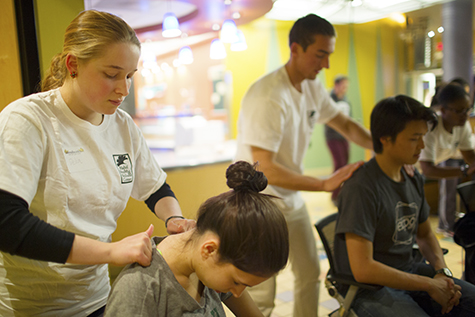
“Some people say they are ticklish and don’t want much; other people say, ‘Put your full body into it,’” said Chassaing, who joined Stressbusters as a freshman. “Either way, I believe every person comes away with something. Just being in that chair for five minutes and being present can make a difference.”
Research proves that massage reduces anxiety, blood pressure, heart rate and depression, Ruwitch said.
“It is one of many tools to fight stress,” Ruwitch said. “Sometimes, students are not even aware of how much tension they carry in their bodies. Over time, all of that stress can have an impact on our health.”
Stressbusters improve their technique by giving each other backrubs and feedback. Chassaing has learned a lot from her peers and now is a favorite among regulars at Stressbuster events, Ruwitch said. Chassaing, who is majoring in economics in Arts & Sciences, also serves as a residential peer health educator.
“People appreciate her backrubs,” Ruwitch said. “Some have requested her to be their Stressbuster, which means they may have to wait longer in line at the event, but it is worth it to them.”
To join Stressbusters, apply online. Training starts Feb. 1.